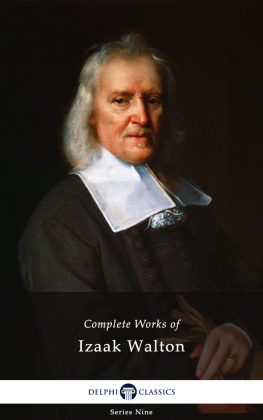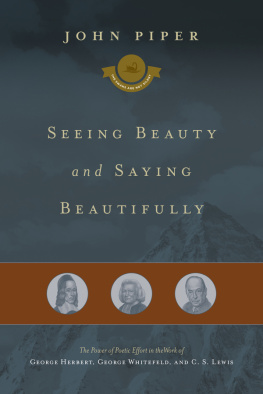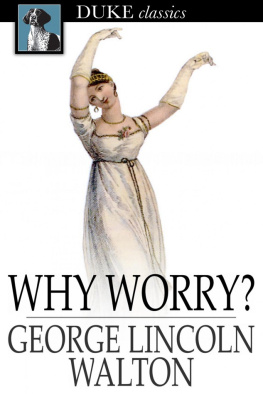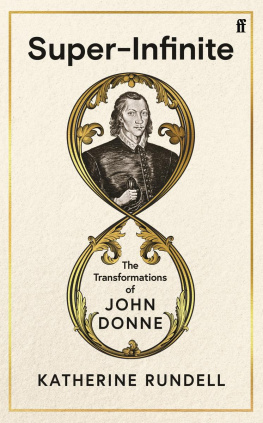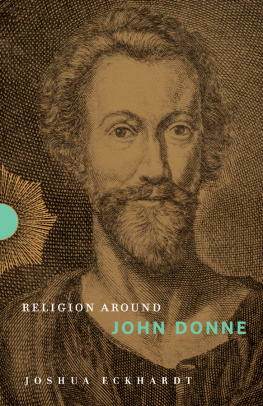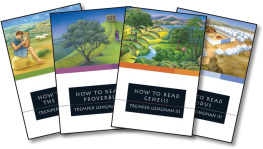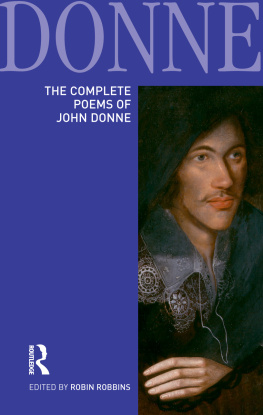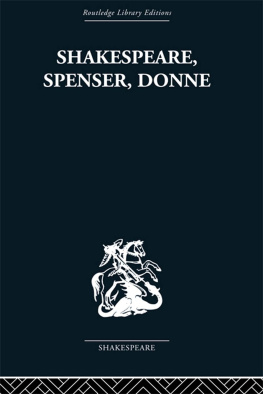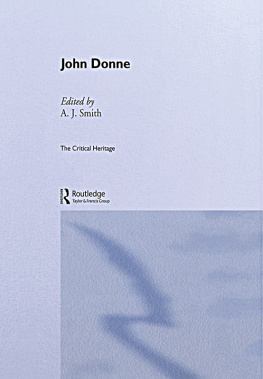CONTENTS
The Life of Mr. Richard Hooker
The Life of Mr. George Herbert, Prebendary of Salisbury Cathedral
The Life of Dr. Robert Sanderson, Late Lord Bishop of Lincoln
THE LIFE OF MR. RICHARD HOOKER:
THE AUTHOR OF THOSE LEARNED BOOKS OF THE LAWS OF ECCLESIASTICAL POLITY.
"Judicious Hooker, though the cost be spent
On him, that hath a lasting monument
In his own books; yet ought we to express
If not the worth, yet our respectfulness."
SIR WIL. COWPER
INTRODUCTION
[Sidenote: Introduction]
I have been persuaded, by a friend whom I reverence, and ought to obey, to write the Life of RICHARD HOOKER, the happy Author of Fiveif not moreof the eight learned books of "The Laws of Ecclesiastical Polity." And though I have undertaken it, yet it hath been with some unwillingness: because I foresee that it must prove to me, and especially at this time of my age, a work of much labour to enquire, consider, research, and determine what is needful to be known concerning him. For I knew him not in his life, and must therefore not only look back to his death,now sixty-four years past,but almost fifty years beyond, that, even to his childhood and youth; and gather thence such observations and prognostics as may at least adorn, if not prove necessary for the completing of what I have undertaken.
[Sidenote: Reasons for this Life]
This trouble I foresee, and foresee also that it is impossible to escape censures; against which I will not hope my well-meaning and diligence can protect me,for I consider the age in which I liveand shall therefore but intreat of my Reader a suspension of his censures, till I have made known unto him some reasons, which I myself would now gladly believe do make me in some measure fit for this undertaking; and if these reasons shall not acquit me from all censures, they may at least abate of their severity, and this is all I can probably hope for. My reasons follow.
About forty years pastfor I am now past the seventy of my ageI began a happy affinity with William Cranmer,now with God,grand-nephew unto the great Archbishop of that name;a family of noted prudence and resolution; with him and two of his sisters I had an entire and free friendship: one of them was the wife of Dr. Spencer,[1] a bosom friend and sometime com-pupil with Mr. Hooker in Corpus Christi College in Oxford, and after President of the same. I name them here, for that I shall have occasion to mention them in the following discourse, as also George Cranmer, their brother, of whose useful abilities my Reader may have a more authentic testimony than my pen can purchase for him, by that of our learned Camden and others.
[Sidenote: Hooker's friends]
This William Cranmer and his two fore-named sisters had some affinity, and a most familiar friendship, with Mr. Hooker, and had had some part of their education with him in his house, when he was parson of Bishop's-Bourne near Canterbury; in which City their good father then lived. They had, I say, a part of their education with him as myself, since that time, a happy cohabitation with them; and having some years before read part of Mr. Hooker's works with great liking and satisfaction, my affection to them made me a diligent inquisitor into many things that concerned him; as namely, of his persons, his nature, the management of his time, his wife, his family, and the fortune of him and his. Which enquiry hath given me much advantage in the knowledge of what is now under my consideration, and intended for the satisfaction of my Reader.
[Sidenote: Conclusion]
I had also a friendship with the Reverend Dr. Usher,[2] the late learned Archbishop of Armagh; and with Dr. Morton, the late learned and charitable Bishop of Durham; as also the learned John Hales, of Eton College; and with them alsowho loved the very name of Mr. HookerI have had many discourses concerning him; and from them, and many others that have now put off mortality, I might have had more informations, if I could then have admitted a thought of any fitness for what by persuasion I have now undertaken. But though that full harvest be irrecoverably lost, yet my memory hath preserved some gleanings, and my diligence made such additions to them, as I hope will prove useful to the completing of what I intend: in the discovery of which I shall be faithful, and with this assurance put a period to my Introduction.
[Footnote 1: A native of Suffolk, one of the Clerks of Corpus Christi College, Oxford, and Greek Reader. He entered Orders, became a noted Preacher, Chaplain to James I., and a great admirer of Richard Hooker and the famous Dr. John Reynolds, the latter of whom he succeeded as Master of his College. About four years after Hooker's death, he published the Five Books of Ecclesiastical Polity, with a Preface; and dying on April 3rd, 1614, was buried at Oxford.]
[Footnote 2: The illustrious Primate of Ireland, born in Dublin, Jan. 4th, 1580. He was the first Student of Trinity College, in 1593, and in 1610 he was made Bishop of Meath, whence he was translated to Armagh, in 1625. In the Irish Rebellion, he lost every thing but his library, which he conveyed to England, where he died in retirement, March 21st, 1655-56.]
THE LIFE OF MR. RICHARD HOOKER.
[Sidenote: Birth and parentage]
It is not to be doubted, but that Richard Hooker was born at Heavy-tree, near, or within the precincts, or in the City of Exeter; a City which may justly boast, that it was the birth-place of him and Sir Thomas Bodley; as indeed the County may, in which it stands, that it hath furnished this nation with Bishop Jewel, Sir Francis Drake, Sir Walter Raleigh, and many others, memorable for their valour and learning. He was born about the year of our Redemption 1553, and of parents that were not so remarkable for their extraction or riches, as for their virtue and industry, and God's blessing upon both; by which they were enabled to educate their children in some degree of learning, of which our Richard Hooker may appear to be one fair testimony, and that nature is not so partial as always to give the great blessings of wisdom and learning, and with them the greater blessings of virtue and government, to those only that are of a more high and honourable birth.
[Sidenote: "His complexion"]
His complexionif we may guess by him at the age of fortywas sanguine, with a mixture of choler; and yet his motion was slow even in his youth, and so was his speech, never expressing an earnestness in either of them, but an humble gravity suitable to the aged. And it is observed,so far as enquiry is able to look back at this distance of time,that at his being a school-boy he was an early questionist, quietly inquisitive "why this was, and that was not, to be remembered? why this was granted, and that denied?" This being mixed with a remarkable modesty, and a sweet serene quietness of nature, and with them a quick apprehension of many perplexed parts of learning, imposed then upon him as a scholar, made his Master and others to believe him to have an inward blessed divine light, and therefore to consider him to be a little wonder. For in that, children were less pregnant, less confident and more malleable, than in this wiser, but not better, age.



